2024年中考英语二轮语法复习专题九 非谓语动词 课件
文档属性
| 名称 | 2024年中考英语二轮语法复习专题九 非谓语动词 课件 |

|
|
| 格式 | pptx | ||
| 文件大小 | 958.3KB | ||
| 资源类型 | 试卷 | ||
| 版本资源 | 通用版 | ||
| 科目 | 英语 | ||
| 更新时间 | 2024-03-09 00:00:00 | ||
图片预览

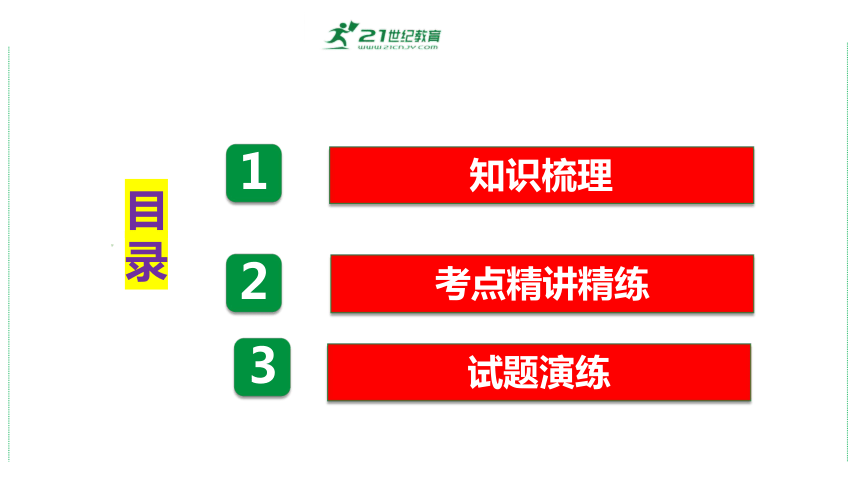



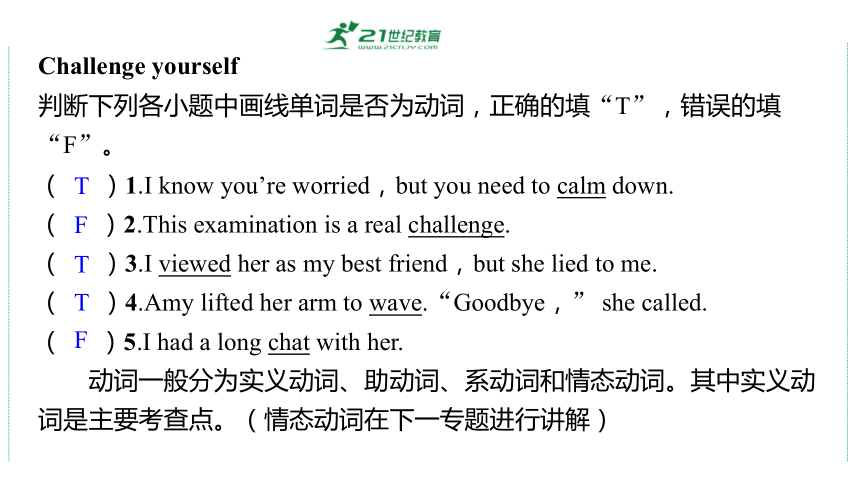
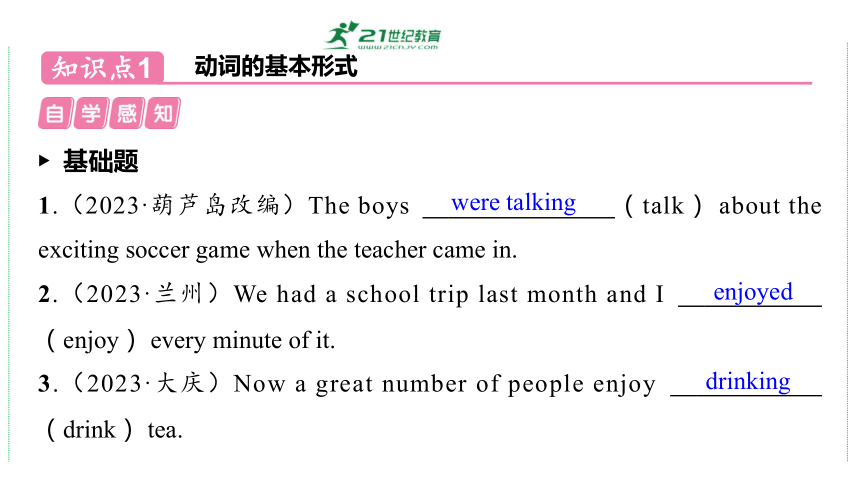
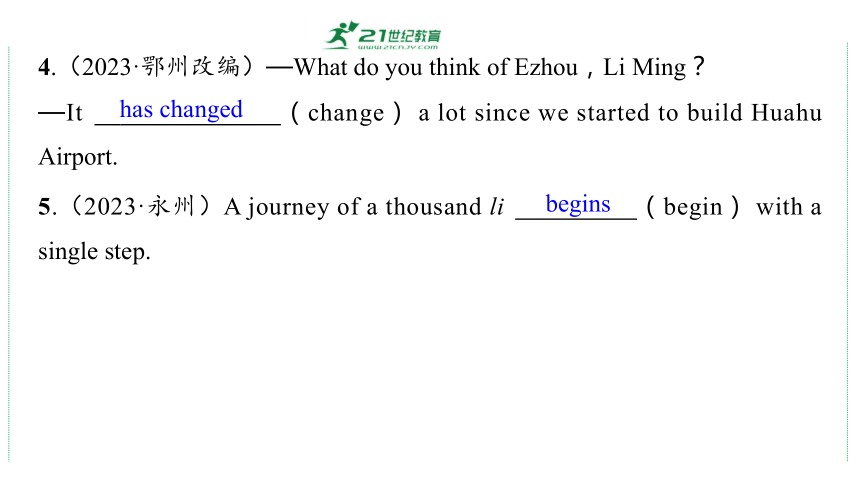
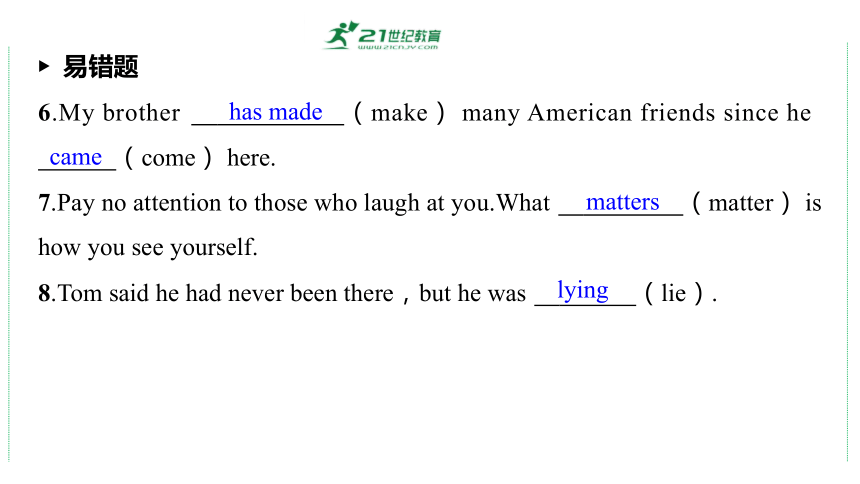
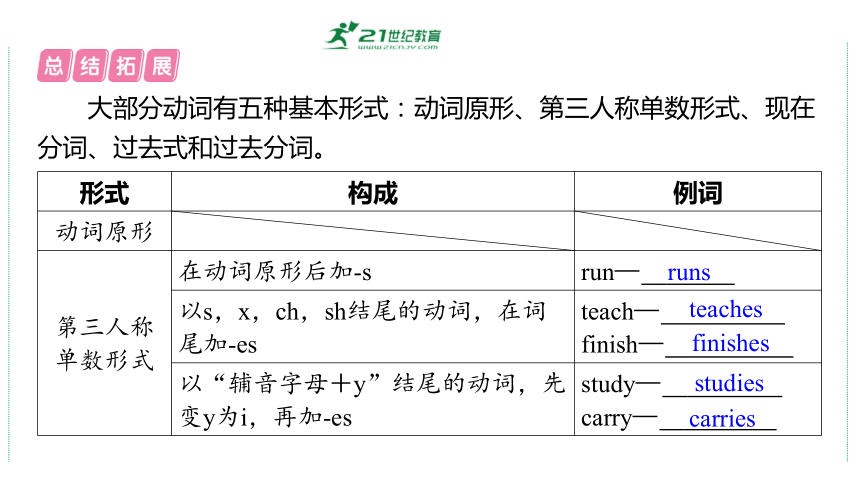
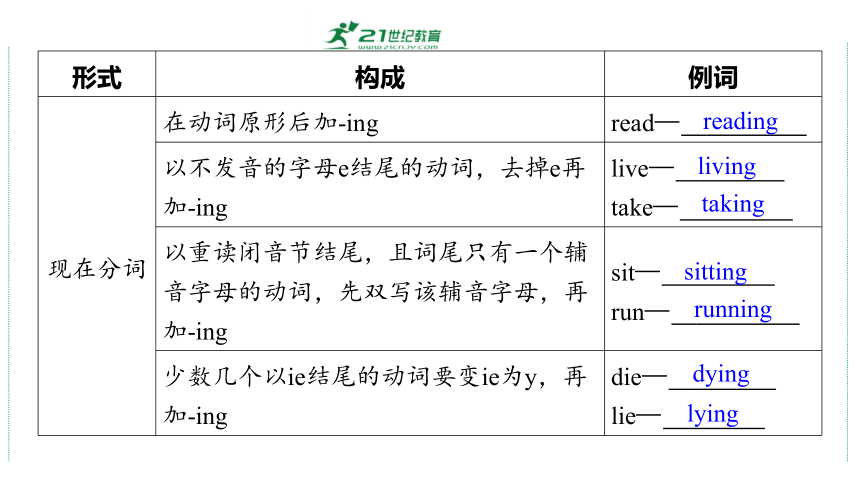
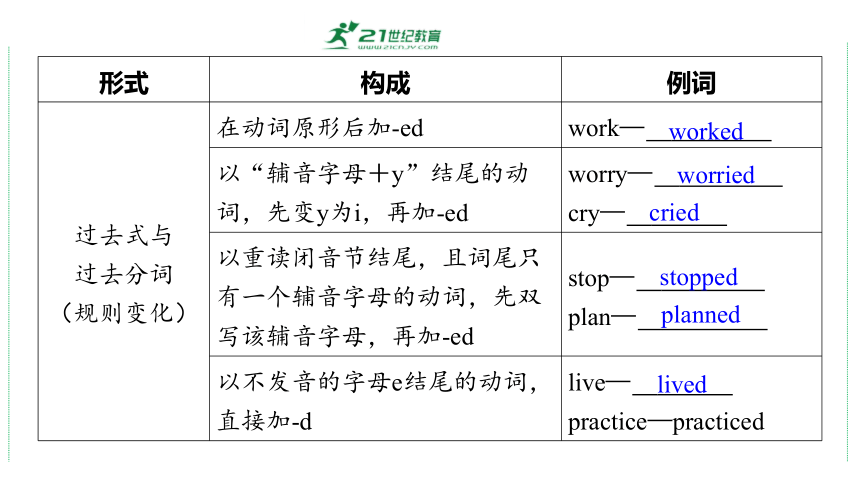
文档简介
(共42张PPT)
专题七 动词与动词短语
中考英语二轮复习语法梳理
目
录
1
知识梳理
2
考点精讲精练
3
试题演练
1
知识梳理
2
考点精讲精练
Challenge yourself
判断下列各小题中画线单词是否为动词,正确的填“T”,错误的填“F”。
( T )1.I know you’re worried,but you need to calm down.
( F )2.This examination is a real challenge.
( T )3.I viewed her as my best friend,but she lied to me.
( T )4.Amy lifted her arm to wave.“Goodbye,” she called.
( F )5.I had a long chat with her.
动词一般分为实义动词、助动词、系动词和情态动词。其中实义动词是主要考查点。(情态动词在下一专题进行讲解)
T
F
T
T
F
动词的基本形式
知识点1
基础题
1.(2023·葫芦岛改编)The boys were talking (talk) about the exciting soccer game when the teacher came in.
2.(2023·兰州)We had a school trip last month and I enjoyed (enjoy) every minute of it.
3.(2023·大庆)Now a great number of people enjoy drinking (drink) tea.
were talking
enjoyed
drinking
4.(2023·鄂州改编)—What do you think of Ezhou,Li Ming?
—It has changed (change) a lot since we started to build Huahu Airport.
has changed
5.(2023·永州)A journey of a thousand li begins (begin) with a single step.
begins
易错题
6.My brother has made (make) many American friends since he came (come) here.
7.Pay no attention to those who laugh at you.What matters (matter) is how you see yourself.
8.Tom said he had never been there,but he was lying (lie).
has made
came
matters
lying
大部分动词有五种基本形式:动词原形、第三人称单数形式、现在分词、过去式和过去分词。
形式 构成 例词
动词原形
第三人称 单数形式 在动词原形后加-s run— runs
以s,x,ch,sh结尾的动词,在词尾加-es teach— teaches
finish— finishes
以“辅音字母+y”结尾的动词,先变y为i,再加-es study— studies
carry— carries
runs
teaches
finishes
studies
carries
形式 构成 例词
现在分词 在动词原形后加-ing read— reading
以不发音的字母e结尾的动词,去掉e再加-ing live— living
take— taking
以重读闭音节结尾,且词尾只有一个辅音字母的动词,先双写该辅音字母,再加-ing sit— sitting
run— running
少数几个以ie结尾的动词要变ie为y,再加-ing die— dying
lie— lying
reading
living
taking
sitting
running
dying
lying
形式 构成 例词
过去式与 过去分词 (规则变化) 在动词原形后加-ed work— worked
以“辅音字母+y”结尾的动词,先变y为i,再加-ed worry— worried
cry— cried
以重读闭音节结尾,且词尾只有一个辅音字母的动词,先双写该辅音字母,再加-ed stop— stopped
plan— planned
以不发音的字母e结尾的动词,直接加-d live— lived
practice—practiced
worked
worried
cried
stopped
planned
lived
实义动词与助动词的用法
知识点2
基础题
1.(2023·苏州改编)The whole town is celebrating (celebrate) the opening of the new bridge with a huge party.
2.(2023·通辽改编)It has been (be) two years since the Whites came to China.
celebrating
has been
3.(2023·威海)After the meal,I asked Grand-dad,“ Will you use (use) photos on social media to choose your food next time you eat out?”
4.(2023·枣庄)It was reported (report) that there were over 100,000 people on Mount Tai on May 1st,2023.
Will
use
was reported
5.(2023·常德)—What’s your prediction about the future?
—I think there will be (be) less pollution.
will be
易错题
6.In England,tea didn’t appear until around 1660.
didn’t
7.You won’t catch the first bus unless you leave now.
8.I don’t have a basketball,but my friend David does .
won’t
does
1.实义动词
实义动词本身含有实际意义,表示动作或状态,在句中能独立作谓语。其分类及用法如下:
分类 用法 例句
按句法 功能分 及物 动词 本身意义不完整,需要接 宾语 才能使意义完整 Please open the window.
请打开窗户。
不及物 动词 本身意义完整,无需接宾语。若不及物动词要接宾语,其后需加适当的 介词 He works hard.
他努力工作。
I like listening to music.
我喜欢听音乐。
宾语
介
词
分类 用法 例句
按动作发生的方式、发生过程的长短分 延续性 动词 表示能够延续的动作,如:learn,work,keep,sleep,live等,可以与表示时间段的状语(for+时间段,since+时间点,since从句)连用 I have lived here for five years.
我在这儿住了五年了。
非延续性 动词 也称瞬间动词,表示不能延续的动作,动作发生后立即结束,如:open,die,begin,finish,come,borrow,lend,buy等,不能与表示时间段的状语连用 I borrowed a book from the library.我从图书馆借了一本书。
非延
续性
2.助动词
助动词不能独立作谓语,只能和主要动词(主要是实义动词)一起构成谓语,表示否定、疑问、时态、语态等语法形式。常见助动词有be,do,have,will/shall等,具体用法如下:
助动词 功能 例句
be 构成现在进行时: am/is/are +现在分词 I am listening to music.我正在听音乐。
构成过去进行时: was/were +现在分词 I was taking a shower at 8:00 last night.昨晚八点我正在洗澡。
am/is/are
was/were
助动词 功能 例句
be 构成一般将来时:am/is/are+going to+动词原形 They are going to have a trip next month.下个月他们将要去旅行。
构成被动语态:be(am/is/are/was/were)+过去分词 Many trees are planted every year.
每年种植很多树。
助动词 功能 例句
do 构成疑问句、否定句\[一般现在时中用do,does(单三式),一般过去时中用did\] Do you like reading?你喜欢阅读吗?
He didn’t go to school yesterday.
他昨天没有去上学。
构成否定祈使句: Don’t +动词原形 Don’t arrive late for class.
上课不要迟到。
Don’t
助动词 功能 例句
have 构成现在完成时: have/has +过去分词 I have taught English in the school for three years.
我已在这所学校教了三年英语了。
will/shall 构成一般将来时: will/shall +动词原形 She will go to Beijing next Monday.
下周一她将去北京。
have/has
will/shall
◆助动词在省略句中的运用为了避免重复,一些句子常常省略(前面提到过的)谓语动词,而用相应的助动词代替此谓语动词,助动词要与句子的人称、时态一致。这种用法也常用于一般疑问句的简略回答中。如:
She won’t go there,but I will(=but I will go there).
[用助动词will代替will go there]
—Do you have a pen?
—Yes,I do(=I have a pen).
[用助动词do代替have a pen]
系动词的用法
知识点3
基础题
1.(2023·宜宾)School gardening is (be) now very popular.
2.(2023·孝感改编)—Daniel,try this strawberry cake.
—It tastes (taste)delicious.I’d like to have some more.
is
tastes
3.(2023·临沂)Suddenly,the dogs became silent (silence) and ran around with their noses to the ground.
4.(2023·乐山)When the Shenzhou 16 sent our astronauts into space,we Chinese people felt so proud (自豪的).
5.(2023·牡丹江改编)—Your skirt looks so special.
—Oh yes,it’s very popular these days.It’s a horse-face skirt.
silent
proud
looks
易错题
6.The meat on the table smells bad (bad/badly).Throw it away.
7.The children all looked sadly at the broken model plane and felt quite sad (sad/sadly).
8.These oranges look nice,but taste very sour.
bad
sadly
sad
taste
系动词用于连接主语和表语,表示主语的身份、性质和状态等。系动词不能单独作谓语,后面必须跟形容词、名词或介词短语等作表语。英语中常见的系动词有:
常用系动词 词义 例句
be 是 I’m a girl with short hair.我是一名短发女孩。
become 变得 Huang Lei becomes interested in English.黄磊变得对英语产生了兴趣。
turn The leaves are turning yellow.树叶正在变黄。
get The weather is getting bad.天气正变得糟糕。
sound 听起来 The plan sounds good.这个计划听起来不错。
听起
来
常用系动词 词义 例句
smell 闻起来 The flowers smell sweet.这些花闻起来很香。
taste 尝起来 The soup tastes delicious.这汤尝起来很美味。
look 看起来 My mother looks very young.我的妈妈看起来很年轻。
feel 感到,摸起来 The coat feels very soft.这件外套摸起来很柔软。
stay 保持 The shop stays open till 8:00 p.m.这家商店一直开到晚上八点。
keep 保持 The girl keeps silent all the time.这个女孩一直保持沉默。
闻起来
尝起来
看起来
动词短语
知识点4
基础题
1.(2023·牡丹江改编)—Rex,guess what? Born to Fly (《长空之王》) came out (上映) last week.
—Yes.It shows the dangers and risks that the pilots face.
2.(2023·株洲改编)My parents are happy that I often look after my little sister at home.
came out
after
3.(2023·云南改编)It’s a good habit to turn off the lights when you leave a room.
4.(2023·滨州改编)—Do you know the astronaut Wang Yaping?
—Sure.She is a great woman who can stick to (坚持) her dreams.I really look up to her.
off
stick to
5.(2023·长春改编)我的朋友总能想起好主意来解决他的问题。
My friend can always come up with good ideas to solve his problems.
come up with
易错题
6.—What does your uncle look like ?
—He is really tall.
7.Lisa decided to give these old toys away to the poor children.
8.If you meet some new words,you can look them up in a dictionary.
like
away
them
动词短语是指动词跟介词或副词等构成的固定短语。常见分类有:
类型 位置 示例
动词+介词 宾语(名词或代词宾格)只能位于介词后面 arrive at/in 到达,get to 到达 ,
ask for请求,come from来自,
laugh at 嘲笑,listen to听,
look after照顾,wait for 等待
到达
laugh at
等待
类型 位置 示例
动词+副词 宾语为代词(宾格)时,只能位于动词和副词之间;宾语为名词时,位于副词前后均可 find out查明, give up 放弃,
put off 推迟,turn on打开,
think over 仔细考虑
give up
put off
仔细考虑
类型 位置 示例
动词+副词+介词 宾语(名词或代词宾格)只能位于介词后面 come up with想出,
look forward to 期待,
get on/along with 与……和睦相处 ,
keep away from 远离
look forward to
与……和睦相处
远离
类型 位置 示例
动词+名词+介词 名词之前可加形容词来修饰,宾语(名词或代词宾格)只能位于介词后面 make friends with 和……交朋友,
make use of 利用 ,
pay attention to注意,
take part in 参加 ,
take care of照顾
make friends with
利用
参加
3
试题演练
根据语境,用所给词的适当形式填空。
1.(2023·湖南株州改编)Today, we must continue working (keep) our skies blue,waters clean and lands clear.
2.(2023·湖南怀化改编)Many people enjoy (make) zongzi by themselves on the Dragon Boat Festival.
3.(2023·四川自贡改编)—Mike,we are told not (answer) the phone while crossing the street.
—I am sorry. I won’t do it again.
to keep
making
to answer
4.She thinks she knows more than I do,so she can always tell me what
(do).
5.Today is Father’s Day,and I plan (prepare) a dinner for my father.
6.He helped me to find the right violin books for me and he always spent time
(teach) me.
7.I opened the door and all my friends shouted “Happy Birthday!” I had no idea they coming. I was so (surprise).
to do
to prepare
teaching
surprised
8.Jiuzhaigou is one of the most popular places in China and the number of the visitors keeps (rise).
9.The teachers used to (write) key points on the blackboard,but now they are getting used to (show) them through PPTs.
10.My dad knew how much my mum loved her job,so he stopped
(work) to stay at home and look after me.
11.Why not (ask) your teacher for help when you can’t finish
(write) it by yourself
12.A mobile phone of this type costs too much.You’d better (wait).
rising
write
showing
working
ask
writing
wait
13.—Shall we stay at home watching TV tonight
—No,I’d like (go) and see a movie.
14.—I’m very tired these days because of studying for physics.
—Why not (listen) music.It can make you (relax).
15.My roommate often asks me (teach) her to play chess.
to go
listen to
relax
to teach
专题七 动词与动词短语
中考英语二轮复习语法梳理
目
录
1
知识梳理
2
考点精讲精练
3
试题演练
1
知识梳理
2
考点精讲精练
Challenge yourself
判断下列各小题中画线单词是否为动词,正确的填“T”,错误的填“F”。
( T )1.I know you’re worried,but you need to calm down.
( F )2.This examination is a real challenge.
( T )3.I viewed her as my best friend,but she lied to me.
( T )4.Amy lifted her arm to wave.“Goodbye,” she called.
( F )5.I had a long chat with her.
动词一般分为实义动词、助动词、系动词和情态动词。其中实义动词是主要考查点。(情态动词在下一专题进行讲解)
T
F
T
T
F
动词的基本形式
知识点1
基础题
1.(2023·葫芦岛改编)The boys were talking (talk) about the exciting soccer game when the teacher came in.
2.(2023·兰州)We had a school trip last month and I enjoyed (enjoy) every minute of it.
3.(2023·大庆)Now a great number of people enjoy drinking (drink) tea.
were talking
enjoyed
drinking
4.(2023·鄂州改编)—What do you think of Ezhou,Li Ming?
—It has changed (change) a lot since we started to build Huahu Airport.
has changed
5.(2023·永州)A journey of a thousand li begins (begin) with a single step.
begins
易错题
6.My brother has made (make) many American friends since he came (come) here.
7.Pay no attention to those who laugh at you.What matters (matter) is how you see yourself.
8.Tom said he had never been there,but he was lying (lie).
has made
came
matters
lying
大部分动词有五种基本形式:动词原形、第三人称单数形式、现在分词、过去式和过去分词。
形式 构成 例词
动词原形
第三人称 单数形式 在动词原形后加-s run— runs
以s,x,ch,sh结尾的动词,在词尾加-es teach— teaches
finish— finishes
以“辅音字母+y”结尾的动词,先变y为i,再加-es study— studies
carry— carries
runs
teaches
finishes
studies
carries
形式 构成 例词
现在分词 在动词原形后加-ing read— reading
以不发音的字母e结尾的动词,去掉e再加-ing live— living
take— taking
以重读闭音节结尾,且词尾只有一个辅音字母的动词,先双写该辅音字母,再加-ing sit— sitting
run— running
少数几个以ie结尾的动词要变ie为y,再加-ing die— dying
lie— lying
reading
living
taking
sitting
running
dying
lying
形式 构成 例词
过去式与 过去分词 (规则变化) 在动词原形后加-ed work— worked
以“辅音字母+y”结尾的动词,先变y为i,再加-ed worry— worried
cry— cried
以重读闭音节结尾,且词尾只有一个辅音字母的动词,先双写该辅音字母,再加-ed stop— stopped
plan— planned
以不发音的字母e结尾的动词,直接加-d live— lived
practice—practiced
worked
worried
cried
stopped
planned
lived
实义动词与助动词的用法
知识点2
基础题
1.(2023·苏州改编)The whole town is celebrating (celebrate) the opening of the new bridge with a huge party.
2.(2023·通辽改编)It has been (be) two years since the Whites came to China.
celebrating
has been
3.(2023·威海)After the meal,I asked Grand-dad,“ Will you use (use) photos on social media to choose your food next time you eat out?”
4.(2023·枣庄)It was reported (report) that there were over 100,000 people on Mount Tai on May 1st,2023.
Will
use
was reported
5.(2023·常德)—What’s your prediction about the future?
—I think there will be (be) less pollution.
will be
易错题
6.In England,tea didn’t appear until around 1660.
didn’t
7.You won’t catch the first bus unless you leave now.
8.I don’t have a basketball,but my friend David does .
won’t
does
1.实义动词
实义动词本身含有实际意义,表示动作或状态,在句中能独立作谓语。其分类及用法如下:
分类 用法 例句
按句法 功能分 及物 动词 本身意义不完整,需要接 宾语 才能使意义完整 Please open the window.
请打开窗户。
不及物 动词 本身意义完整,无需接宾语。若不及物动词要接宾语,其后需加适当的 介词 He works hard.
他努力工作。
I like listening to music.
我喜欢听音乐。
宾语
介
词
分类 用法 例句
按动作发生的方式、发生过程的长短分 延续性 动词 表示能够延续的动作,如:learn,work,keep,sleep,live等,可以与表示时间段的状语(for+时间段,since+时间点,since从句)连用 I have lived here for five years.
我在这儿住了五年了。
非延续性 动词 也称瞬间动词,表示不能延续的动作,动作发生后立即结束,如:open,die,begin,finish,come,borrow,lend,buy等,不能与表示时间段的状语连用 I borrowed a book from the library.我从图书馆借了一本书。
非延
续性
2.助动词
助动词不能独立作谓语,只能和主要动词(主要是实义动词)一起构成谓语,表示否定、疑问、时态、语态等语法形式。常见助动词有be,do,have,will/shall等,具体用法如下:
助动词 功能 例句
be 构成现在进行时: am/is/are +现在分词 I am listening to music.我正在听音乐。
构成过去进行时: was/were +现在分词 I was taking a shower at 8:00 last night.昨晚八点我正在洗澡。
am/is/are
was/were
助动词 功能 例句
be 构成一般将来时:am/is/are+going to+动词原形 They are going to have a trip next month.下个月他们将要去旅行。
构成被动语态:be(am/is/are/was/were)+过去分词 Many trees are planted every year.
每年种植很多树。
助动词 功能 例句
do 构成疑问句、否定句\[一般现在时中用do,does(单三式),一般过去时中用did\] Do you like reading?你喜欢阅读吗?
He didn’t go to school yesterday.
他昨天没有去上学。
构成否定祈使句: Don’t +动词原形 Don’t arrive late for class.
上课不要迟到。
Don’t
助动词 功能 例句
have 构成现在完成时: have/has +过去分词 I have taught English in the school for three years.
我已在这所学校教了三年英语了。
will/shall 构成一般将来时: will/shall +动词原形 She will go to Beijing next Monday.
下周一她将去北京。
have/has
will/shall
◆助动词在省略句中的运用为了避免重复,一些句子常常省略(前面提到过的)谓语动词,而用相应的助动词代替此谓语动词,助动词要与句子的人称、时态一致。这种用法也常用于一般疑问句的简略回答中。如:
She won’t go there,but I will(=but I will go there).
[用助动词will代替will go there]
—Do you have a pen?
—Yes,I do(=I have a pen).
[用助动词do代替have a pen]
系动词的用法
知识点3
基础题
1.(2023·宜宾)School gardening is (be) now very popular.
2.(2023·孝感改编)—Daniel,try this strawberry cake.
—It tastes (taste)delicious.I’d like to have some more.
is
tastes
3.(2023·临沂)Suddenly,the dogs became silent (silence) and ran around with their noses to the ground.
4.(2023·乐山)When the Shenzhou 16 sent our astronauts into space,we Chinese people felt so proud (自豪的).
5.(2023·牡丹江改编)—Your skirt looks so special.
—Oh yes,it’s very popular these days.It’s a horse-face skirt.
silent
proud
looks
易错题
6.The meat on the table smells bad (bad/badly).Throw it away.
7.The children all looked sadly at the broken model plane and felt quite sad (sad/sadly).
8.These oranges look nice,but taste very sour.
bad
sadly
sad
taste
系动词用于连接主语和表语,表示主语的身份、性质和状态等。系动词不能单独作谓语,后面必须跟形容词、名词或介词短语等作表语。英语中常见的系动词有:
常用系动词 词义 例句
be 是 I’m a girl with short hair.我是一名短发女孩。
become 变得 Huang Lei becomes interested in English.黄磊变得对英语产生了兴趣。
turn The leaves are turning yellow.树叶正在变黄。
get The weather is getting bad.天气正变得糟糕。
sound 听起来 The plan sounds good.这个计划听起来不错。
听起
来
常用系动词 词义 例句
smell 闻起来 The flowers smell sweet.这些花闻起来很香。
taste 尝起来 The soup tastes delicious.这汤尝起来很美味。
look 看起来 My mother looks very young.我的妈妈看起来很年轻。
feel 感到,摸起来 The coat feels very soft.这件外套摸起来很柔软。
stay 保持 The shop stays open till 8:00 p.m.这家商店一直开到晚上八点。
keep 保持 The girl keeps silent all the time.这个女孩一直保持沉默。
闻起来
尝起来
看起来
动词短语
知识点4
基础题
1.(2023·牡丹江改编)—Rex,guess what? Born to Fly (《长空之王》) came out (上映) last week.
—Yes.It shows the dangers and risks that the pilots face.
2.(2023·株洲改编)My parents are happy that I often look after my little sister at home.
came out
after
3.(2023·云南改编)It’s a good habit to turn off the lights when you leave a room.
4.(2023·滨州改编)—Do you know the astronaut Wang Yaping?
—Sure.She is a great woman who can stick to (坚持) her dreams.I really look up to her.
off
stick to
5.(2023·长春改编)我的朋友总能想起好主意来解决他的问题。
My friend can always come up with good ideas to solve his problems.
come up with
易错题
6.—What does your uncle look like ?
—He is really tall.
7.Lisa decided to give these old toys away to the poor children.
8.If you meet some new words,you can look them up in a dictionary.
like
away
them
动词短语是指动词跟介词或副词等构成的固定短语。常见分类有:
类型 位置 示例
动词+介词 宾语(名词或代词宾格)只能位于介词后面 arrive at/in 到达,get to 到达 ,
ask for请求,come from来自,
laugh at 嘲笑,listen to听,
look after照顾,wait for 等待
到达
laugh at
等待
类型 位置 示例
动词+副词 宾语为代词(宾格)时,只能位于动词和副词之间;宾语为名词时,位于副词前后均可 find out查明, give up 放弃,
put off 推迟,turn on打开,
think over 仔细考虑
give up
put off
仔细考虑
类型 位置 示例
动词+副词+介词 宾语(名词或代词宾格)只能位于介词后面 come up with想出,
look forward to 期待,
get on/along with 与……和睦相处 ,
keep away from 远离
look forward to
与……和睦相处
远离
类型 位置 示例
动词+名词+介词 名词之前可加形容词来修饰,宾语(名词或代词宾格)只能位于介词后面 make friends with 和……交朋友,
make use of 利用 ,
pay attention to注意,
take part in 参加 ,
take care of照顾
make friends with
利用
参加
3
试题演练
根据语境,用所给词的适当形式填空。
1.(2023·湖南株州改编)Today, we must continue working (keep) our skies blue,waters clean and lands clear.
2.(2023·湖南怀化改编)Many people enjoy (make) zongzi by themselves on the Dragon Boat Festival.
3.(2023·四川自贡改编)—Mike,we are told not (answer) the phone while crossing the street.
—I am sorry. I won’t do it again.
to keep
making
to answer
4.She thinks she knows more than I do,so she can always tell me what
(do).
5.Today is Father’s Day,and I plan (prepare) a dinner for my father.
6.He helped me to find the right violin books for me and he always spent time
(teach) me.
7.I opened the door and all my friends shouted “Happy Birthday!” I had no idea they coming. I was so (surprise).
to do
to prepare
teaching
surprised
8.Jiuzhaigou is one of the most popular places in China and the number of the visitors keeps (rise).
9.The teachers used to (write) key points on the blackboard,but now they are getting used to (show) them through PPTs.
10.My dad knew how much my mum loved her job,so he stopped
(work) to stay at home and look after me.
11.Why not (ask) your teacher for help when you can’t finish
(write) it by yourself
12.A mobile phone of this type costs too much.You’d better (wait).
rising
write
showing
working
ask
writing
wait
13.—Shall we stay at home watching TV tonight
—No,I’d like (go) and see a movie.
14.—I’m very tired these days because of studying for physics.
—Why not (listen) music.It can make you (relax).
15.My roommate often asks me (teach) her to play chess.
to go
listen to
relax
to teach
同课章节目录
- 词法
- 名词
- 动词和动词短语
- 动词语态
- 动词时态
- 助动词和情态动词
- 非谓语动词
- 冠词
- 代词
- 数词和量词
- 形容词副词及其比较等级
- 介词和介词短语
- 连词和感叹词
- 构词法
- 相似、相近词比较
- 句法
- 陈述句
- 一般疑问句和否定疑问句
- 特殊疑问句及选择疑问句
- 反意疑问句
- 存在句(There be句型)
- 宾语从句
- 定语从句
- 状语从句
- 主谓一致问题
- 简单句
- 并列句
- 复合句
- 主谓一致
- 主、表语从句
- 名词性从句
- 直接引语和间接引语
- 虚拟语气
- 感叹句
- 强调句
- 倒装句
- 祈使句
- 句子的成分
- 句子的分类
- 题型专区
- 单项选择部分
- 易错题
- 完形填空
- 阅读理解
- 词汇练习
- 听说训练
- 句型转换
- 补全对话
- 短文改错
- 翻译
- 书面表达
- 任务型阅读
- 语法填空
- 其他资料
